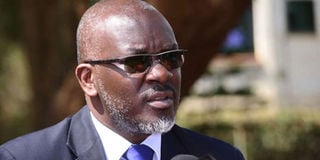LSK seeks to lower cost of election petitions

Law Society of Kenya President Isaac Okero gives a media briefing opposing the crack down on civil society by the government, at the society’s offices in Nairobi on August 16, 2017. The LSK wants cost of election petitions reduced. PHOTO | SALATON NJAU | NATION MEDIA GROUP
What you need to know:
- Rarieda MP Otiende Amollo defended the move by judges to cap the amount of costs to be paid by a losing petitioner.
- Ms Karua has complained about the Sh10 million she was ordered to pay.
The Law Society of Kenya (LSK) is mulling over plans to regulate payments for election petitions.
This follows concerns about the millions of shillings poll petition losers are asked to shoulder.
The LSK president, Isaac Okero, said while the amount of work and the set deadline within which an election petition should be heard and determined would make the costs go up, there needed to be “some degree of regulation” in the figures being quoted.
“With the costs escalating, the way they have, it means the matter of election disputes is the preserve of the wealthy, or the prohibitive costs will work to cause Kenyans with genuine complaints to keep away from the courts, and that is not a good thing,” Mr Okero told the Saturday Nation.
REVIEW LAW
However, he argued that the petitions and after the change of laws ahead of the 2017 election limiting the hearing of cases to six months, lawyers had to contend with copious amounts of documents and “the work is onerous”.
“But there needs to be a balance so that an advocate is adequately remunerated but should not be allowed to begin to erode electoral justice by making it impossible for electoral mischief to be ventilated in courts," he said.
The Advocate Remuneration Act, which sets fees lawyers can charge, and which Mr Okero wants reviewed, provides that a lawyer may charge fees on an hourly rate or as agreed with the client from time to time.
The law sets Sh500,000 as the minimum legal fees a lawyer should charge for opposing or presenting a petition.
“Such fees for petitions are justified due to the care and labour required, the number and length of the papers to be perused, the nature or importance of the matter, the value of the subject matter involved, the interest of the parties, and complexity of the matters,” the Act says.
TIME CONSUMING
Parties represented by lawyers, says the Act, must also cater for the time lawyers attend court, and their transport, including travel and accommodation if he/she lives outside the court’s area of jurisdiction.
An example is Mr Peter Odima, a petitioner in the case challenging the election of Busia Governor Sospeter Ojaamong who has to pay huge costs after he lost the petition.
Mr Odima was slapped with a Sh12 million bill, with Mr Ojaamong, the poll commission and returning officer Fredrick Apopa each awarded Sh4 million.
Rarieda MP Otiende Amollo, who was Mr Ojaamong’s lead lawyer, defended the amount, terming it reasonable.
“We restricted our petitions to be heard and determined within six months. What that means is that as a lawyer, you are spending almost all of your time on the petition,” he said this week.
KARUA CASE
He also defended the move by judges to cap the amount of costs to be paid by a losing petitioner.
“Judges put a cap (on the costs) so as to restrict the cost, not to increase it. If you were to leave it to lawyers to quote their time, and the copious amounts of documents, the costs could be much higher,” Mr Amollo said.
The second highest costs awarded were in the case filed by Narc-Kenya party leader Martha Karua challenging the election of Kirinyaga Governor Anne Waiguru.
Ms Karua has, among other things in the appeal case she has filed, complained about the Sh10 million she was ordered to pay.
WAVINYA NDETI
Equally, Ms Wavinya Ndeti has been slapped with a Sh10 million bill in a case challenging the election of Machakos Governor Alfred Mutua.
Former Kisumu Governor Jack Ranguma, who has appealed his case, was ordered by the High Court in Kisumu to pay his successor Prof Anyang’ Nyong’o Sh5 million as costs to an election petition he filed.
In Kisii, Mr George Ogake and Mr Charles Orito, who were challenging the election of Prof Sam Ongeri as Kisii senator, were slapped with a Sh8 million bill.
Public debate has also increased with the revelation that out of the 175 cases the courts have heard so far, only nine have been successful.





